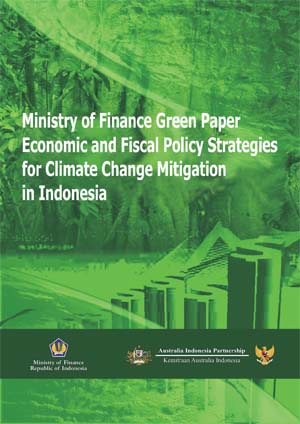Indonesia is in Copenhagen with an announced target of reducing emissions by between 26 per cent and 41 per cent at 2020, compared to a business-as-usual scenario. Behind the scenes, serious work is going on to identify policy approaches that can deliver on this goal.
Indonesia’s Ministry of Finance this week released a Green Paper on Economic and Fiscal Policy Strategies for Climate Change Mitigation in Indonesia.
The Green Paper, developed by the Ministry of Finance’s Fiscal Policy Office in collaboration with an Australian team of experts, spells out a longer-term strategic framework for climate policy-making. It sets out concrete strategies for forestry and land use change which account for the bulk of Indonesia’s emissions now, as well as for the energy sector which is on a fast growth trajectory and in a few decades could take over all other emissions sources combined.
A move towards carbon pricing for Indonesia’s fossil fuel emissions is recommended as the backbone of a policy platform to reduce emissions at least cost. This will be seen as the most ambitious recommended strategy. The Green Paper shows that if done right, carbon pricing can yield not just substantial reductions in emissions growth, but also efficiency gains and reductions in poverty rates. This is because putting a price on carbon would offset some of the existing price distortions in Indonesia’s energy sector, and it would give the government a large additional source of revenue. It could be used to assist low-income earners, support businesses in the transition, and pay for other climate change measures.
The Green Paper suggests to start emissions pricing through a carbon tax, but points out that later transition to emissions trading is possible. Numerical illustrations in the report are for a carbon tax or levy at Rp 80,000 (roughly $8) per tonne of CO2, below the prices expected in developed countries but enough to trigger some fuel switching and investment in better energy efficiency.
Energy sector reform, and phasing out energy subsidies, as G20 countries including Indonesia recently committed to will further enhance Indonesia’s ability to develop on a low emissions growth path. However, the Green Paper points out that a carbon tax or levy could be introduced in parallel to energy sector reform. To be effective it only requires an adjustment to energy prices that would allow the carbon price to be passed through the supply chain to users.
Carbon pricing for the energy sector would be an ideal underpinning for an Indonesian emissions commitment that could open the door to large-scale international carbon finance inflows. It could take the form of a so-called ‘no-lose sectoral target’, where Indonesia negotiates a target trajectory somewhat below an expected business-as-usual trajectory, and can sell permits if the actual emissions come in below the target, but is not penalised if (against expectations) emissions end up above the target. The Green Paper estimates that this could yield permit export revenues in the order of US$2 to 3 billion per year by 2020.
A widespread perception is that carbon pricing is only an option for the longer term. But this is not necessarily so, given it’s the government’s desire to cut carbon and get efficiency gains through economic reform. Rachmat Witoelar, head of Indonesia’s delegation to the Copenhagen conference and former Environment Minister, said this about the Green Paper’s suggestion for a carbon tax or levy: ‘It should be done eventually, certainly within the tenure of this administration, by 2014.’
In the short term, one of the things that could help dampen emissions growth is a revamp of geothermal power policy, which has been on the cards already and is listed in the government’s 100 day program. Indonesia has the world’s largest geothermal resource, but utilisation is very low. Few power stations have been built since the 1997-98 crisis. The Green Paper suggests a strategy to try to get geothermal online in an economically efficient manner: pay a tariff for geothermal power equal to the ‘true cost’ of supplying electricity from fossil fuel alternatives, that is including all explicit and hidden subsidies and a carbon premium; put in place profit sharing arrangements; and give government a greater role in exploration of geothermal fields.
Regarding deforestation, forest management and Indonesia’s huge emissions from peat fires, the Ministry of Finance puts emphasis on creating financial incentives for regional governments to do what is within their power to cut carbon. The Green Paper proposes a ‘regional incentive mechanism’ that would pay regional governments for climate change action, using existing and new emerging channels for intergovernmental fiscal transfers. If Indonesia can successfully design and implement transfer mechanisms for carbon incentives from the international down to the local level, this will be a globally significant innovation.
International finance is a crucial component in making a low-carbon future happen in Indonesia as in other developing countries. The Green Paper points out that attracting carbon dollars is not an end in itself, but that additional international finance is needed to cover investment costs and to help in the transition. Indonesia is positioning itself firmly on middle ground in the international climate finance negotiations, and could well become the broker of a compromise between developed and developing countries. It has been playing a progressive role in the G20 climate finance talks, and is expected to take a constructive and pragmatic position in the Copenhagen talks.
Frank Jotzo is an environmental economist, Senior Lecturer at the ANU Crawford School, and deputy director of the ANU Climate Change Institute.
Salim Mazouz is the founding Director of Ecoperspectives, a Canberra based economic consulting firm with a focus on climate change policy and economics.

